Inside a Grand Tour debut - Three riders and a coming of age at the Vuelta a Espana
Max Poole, Finn Fisher-Black and Felix Engelhardt on what went right, what went wrong and the biggest lessons learned
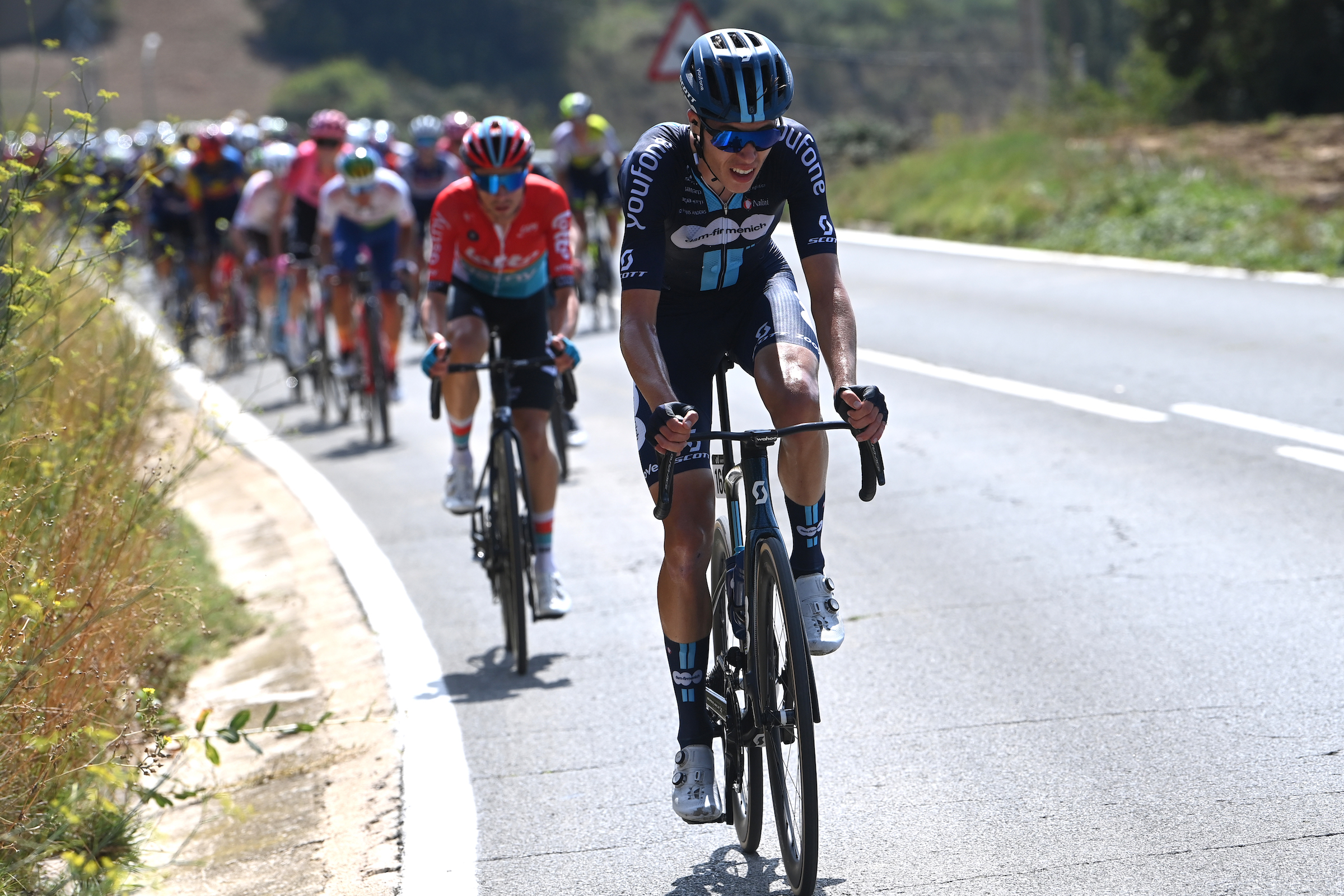

In men’s professional cycling, a three-week Grand Tour debut is like a coming-of-age ceremony, a ritual that all top-level riders must go through to take the next steps on their journeys to becoming established professionals.
Debutants push their bodies to race harder and for longer than ever before. Some thrive, and others struggle.
Finn Fisher-Black (UAE Team Emirates), Max Poole (DSM-Firmenich) and Felix Engelhardt (Jayco-AlUla) all made their Grand Tour debuts at the 2023 Vuelta a España. They spoke to Cyclingnews a few days after the race ended in Madrid to tell us what went right, what went wrong and what they learned.
Anticipation and expectation
All three riders had been planning all year for three weeks in Spain, but nothing could fully prepare them for the demands of a Grand Tour.
“You never feel ready,” said Fisher-Black. “I'm empty after a one-week race, and I couldn't imagine going for another two weeks…At the start, part of me was worried; what if I'm just getting dropped in the last week, every day, just getting my head kicked in?”
Pre-game nerves are part of sport, but when the task at hand is so beyond the limits you’ve reached before, they multiply. Excitement also intensifies, however. The three Grand Tours are not only the longest races on the cycling calendar, but they are also the biggest events. That realisation comes for many riders at the pre-race presentation.
Get The Leadout Newsletter
The latest race content, interviews, features, reviews and expert buying guides, direct to your inbox!
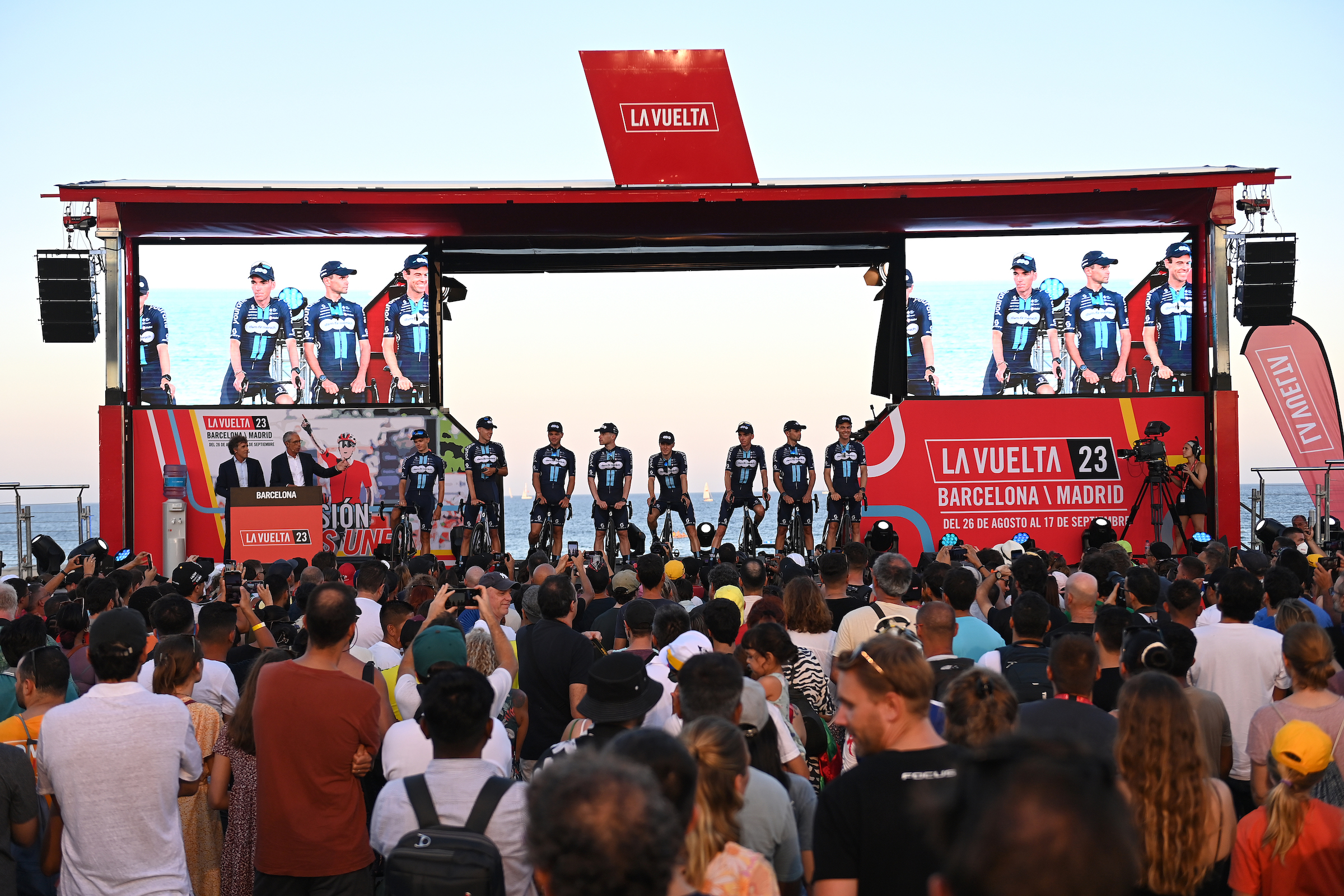
“The team presentation was something I'll probably never forget,” recalled Poole. “You feel like you're there then, I think. It’s been hard to get to this point, not just this year but over the years.”
The size of the event and realisation of a dream also added to the occasion for Engelhardt.
“It's definitely more work and more effort that goes into the race…all the teams bring their kitchen trucks, the buses and whatnot - it's just the highest level of racing that you can get," Engelhardt said.
“It's definitely motivating to give your best, but…there’s a lot of pressure and fighting to get into a Grand Tour squad, so you want to deliver and show the team why you're there in the first place."
The race is on
The Vuelta began with a controversial and dramatic team time trial in Barcelona. Engelhardt and Poole couldn't possibly have had more different experiences.
For Poole, it was the ecstasy of winning your first Grand Tour stage, while Engelhardt and his Jayco-AlUla teammates were devastated after hitting the deck just five kilometres in.
Poole’s DSM-Firmenich squad took advantage of the early start in slightly drier conditions. For the young climber from Lincolnshire, it was a spectacular way to start a Grand Tour career.
“We knew we could do a good ride with the group of riders we had and our equipment, all the experts working hard," Poole said.
“Such a crazy, crazy way, the highest possible way to start, and I'll never forget that feeling of sitting in the seats with the guys and celebrating."
For Engelhardt, the disastrous TTT was just the beginning of a difficult first Grand Tour. A few days later, on stage 5, he sustained an injury to his ribs after a crash, which would hamper him for the rest of the race. It was a tough start, but through the challenges, he learned a valuable lesson – “to not give up and just work through whatever might not be going that well," he said.
“Probably in most other races, I would have pulled out…but doing a Grand Tour, you can't really drop out…I think that part was most different from any normal race. It’s three weeks, it's a long time, and if something goes wrong, you can still turn it around and have a decent race.”
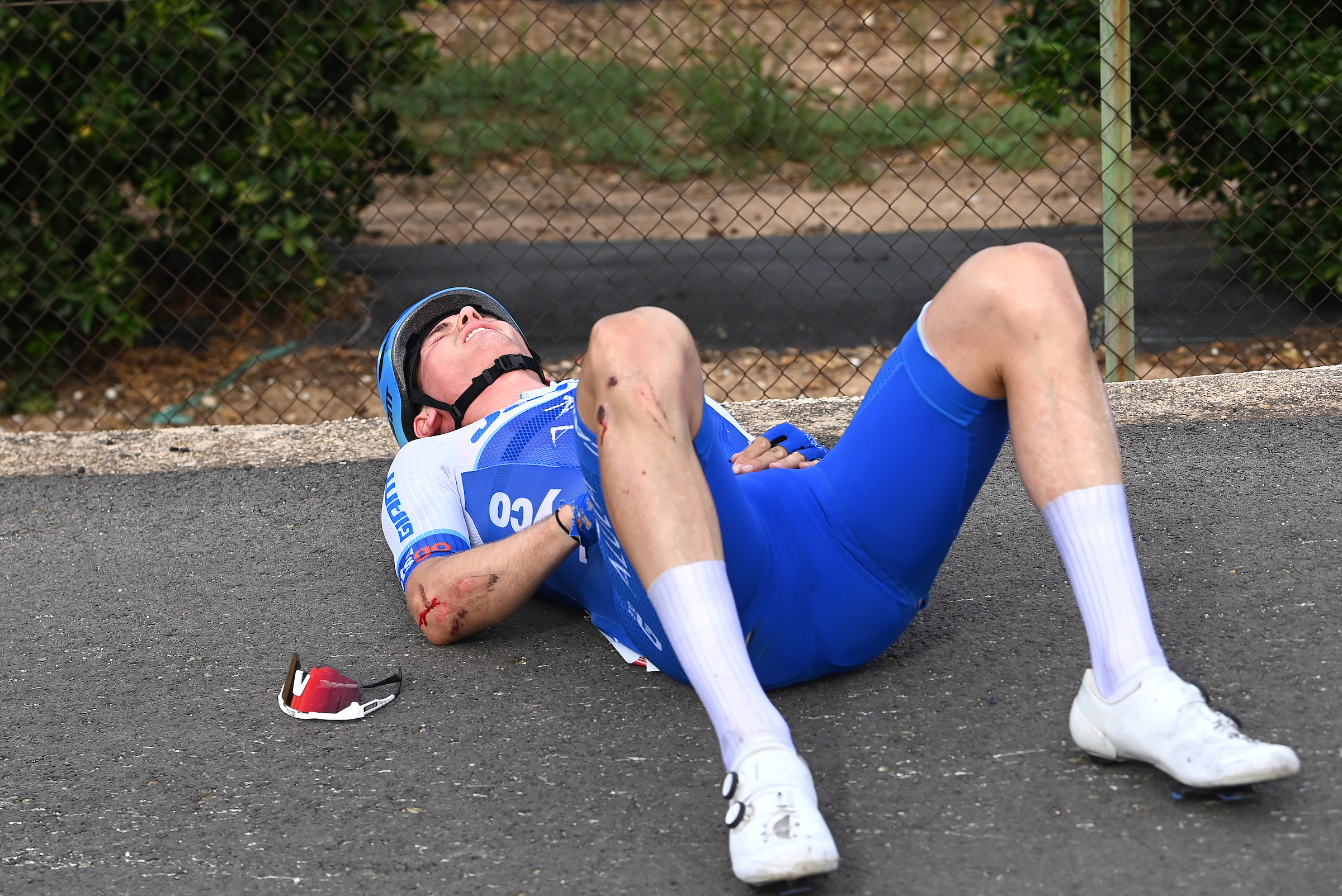
The synchronised crash on that slippery Barcelona bend had further ramifications for Jayco-AlUla. The team’s leader, Eddie Dunbar, pulled out in the days following due to his injuries. That was after secondary leader Filippo Zana had already left the race with stomach issues.
Suddenly, everything that the team had planned for the race was turned around. Grand Tours are all about adapting to changing circumstances, as Engelhardt discovered.
“It's just crazy to see how much effort and work goes into a Grand Tour from the staff side, from the riders' side, and then how quickly it can turn sour with crashes and injuries and illnesses,” Engelhardt reflected.
Especially in a race as big as the Vuelta, when a team has a GC favourite in the line-up, the pressure is on every day.
As Fisher-Black was learning, that pressure on the team doubles when there are also goals to chase results on the flatter days. His first week of Grand Tour racing was a hectic one, particularly as he had to step into the shoes of Jay Vine, who had abandoned.
“Because we had a GC focus and a sprint focus, every day there was a job to be done," Fisher-Black said. "That first week I was hanging out for an easy day, but it just didn't come…every day, I was digging a deeper hole, and then I paid for it in the second week.”
"I'd spent so much energy getting into the break that I was just cooked again"
The Grand Tour breakaway is unlike any other. Smaller teams are seeking exposure, the wily foxes are sniffing out opportunities, and GC teams are looking to shake up the race.
For some riders, it’s their only shot of winning a fabled Grand Tour stage.
All of this, combined with the fatigue which grips most of the peloton in the third week, makes the Grand Tour breakaway a unique challenge. Fisher-Black spent stages 8 and 20 up the road, as well as making a brief dig at the end of stage 16, as UAE Team Emirates chased stages and tried to propel Ayuso and Almeida up the General Classification.
“It was funny because it was my first ever breakaway, I've never been in an early breakaway, even going back to juniors," Fisher-Black said.
“Those two days [stages 8 and 20]…I'd spent so much energy getting into the break that I was just cooked again. What these guys do time after time - it’s crazy how they get in the break and then still can perform in the finals. It's impressive.”
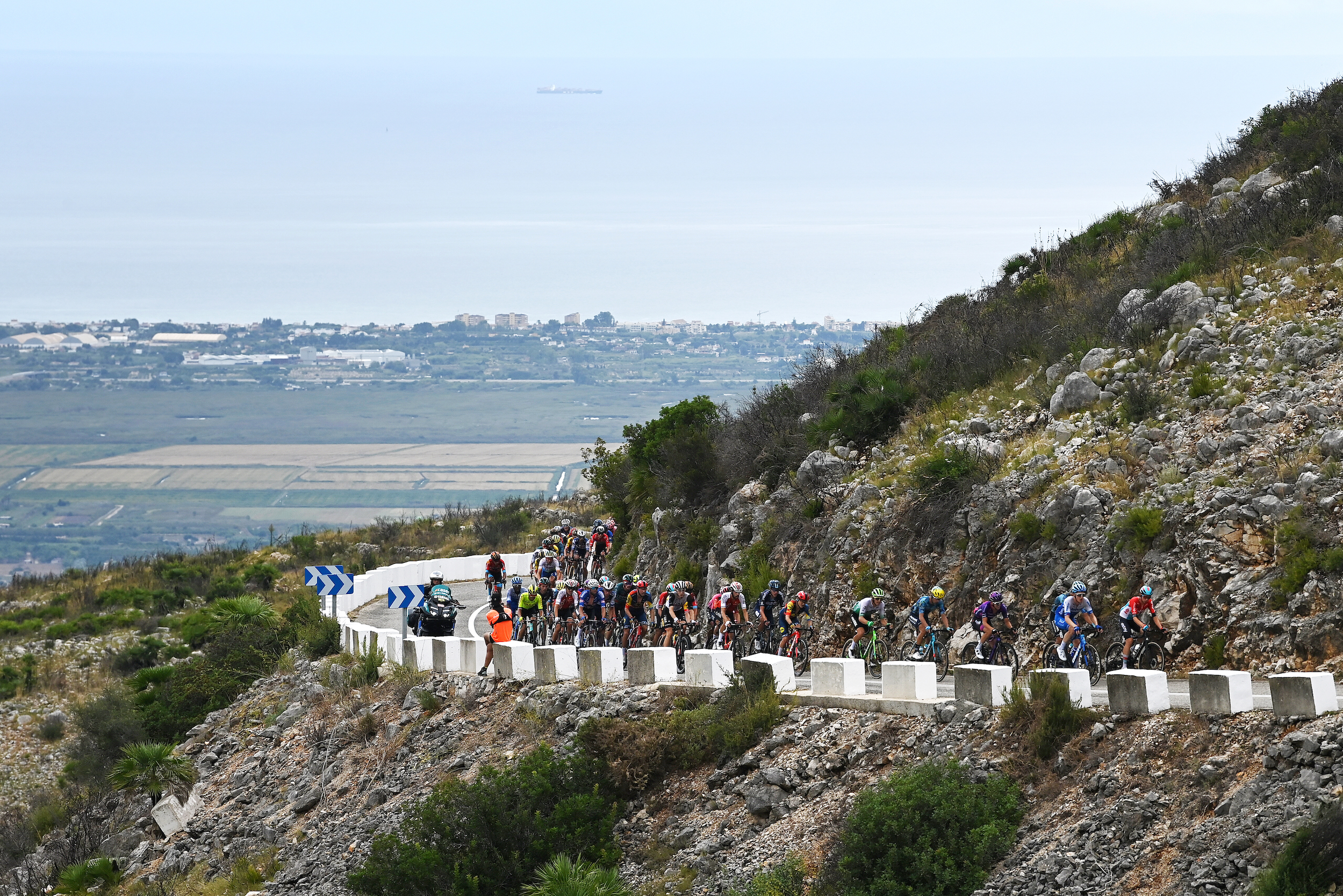
Poole’s ultimate ambition is to race for the general classification in future Grand Tours. He was supposed to ride the Vuelta as if going for the overall until he lost time, at which point he would ride for stages. Unfortunately, some bad luck put paid to that idea early on.
“There was a part for me to try and get some experience and develop in the GC skills. The first week was pretty tough. I had some quite bad stomach problems, like quite a few others, so it was quite disappointing not really to be able to keep going with that only after a few days.”
Once recovered from his illness, Poole switched focus to the breakaways. He benefitted from racing alongside a man riding his 15th Grand Tour in Romain Bardet, as well as Chris Hamilton on his 10th.
“In the meetings, they have a lot of knowledge of how things will go, if it's going to be a big fight for the break - which was every day anyway. They get a feel for what might happen on stages," he said.
“Romain is such an experienced rider; you really can learn a lot from him, and it was really nice to do my first Grand Tour with him in the team.”
Race, eat, recover, repeat
The second and third Mondays of Grand Tours provide respite for weary legs and minds. Rest days are almost unique to these races. Engelhardt has had some experience with them, having raced the Giro Next Gen in 2022, but the fatigue built up during the Vuelta made the two pauses much more necessary.
“I actually recovered quite a bit during the rest day. Otherwise, I probably would have not been able to get through the whole race because I was quite tired and really not feeling that well," Engelhardt said.
It was a new experience for Poole, although not one he particularly enjoyed.
“Personally, I don't think I really like them too much…I just feel like I stiffen up with it. The first one was a bit strange. You're still in the race, but you're not racing. It was my first time really experiencing that," Poole said.
As the second and third weeks dragged on, the full Grand Tour experience began to surface. For Engelhardt, it was like nothing he’d ever done before.
“Everybody's getting a bit more tired. On the other hand, everybody wants to be in a break because there weren't many days left…It's a totally different kind of racing…some people really fly, and then some people really go backwards," Engelhardt said.
Knowledge about nutrition has progressed in the peloton in recent years. Teams take a fine-tuned approach, balancing nutritional input with energy expenditure.
“I was actually quite surprised because on some of the easy days, I hadn't eaten that much on the bike and then I'd have a little post-race snack and then just a light dinner because my expenditure was not that high in the end," Engelhardt said.
"If you sit in the bunch for 150K and push 120 watts average, you're not really doing much. Then, on some of the other days, you really need to eat as much as possible on the bike and even after the race.”
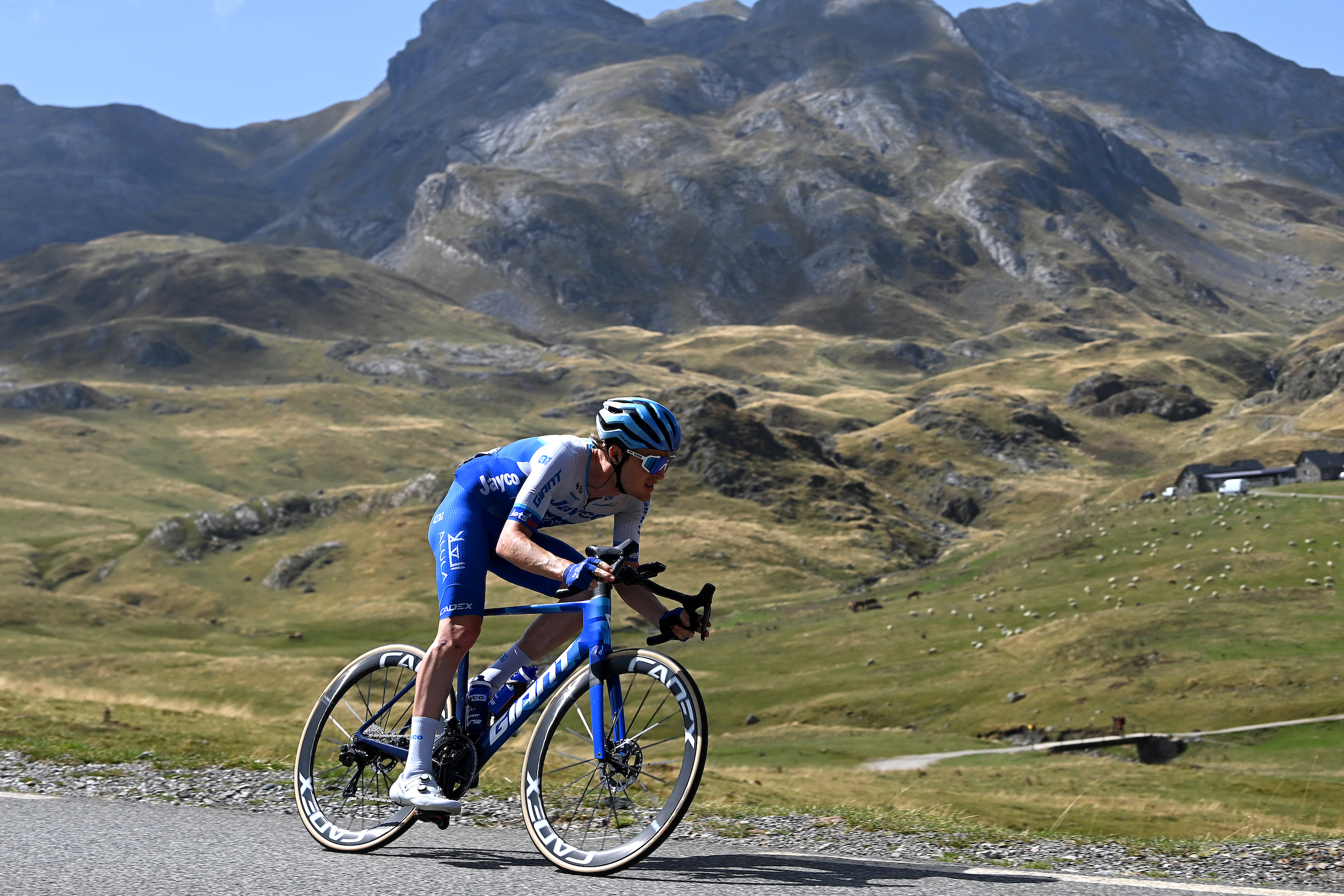
For Fisher-Black, on the other hand, a few days after the Vuelta had finished, he still didn’t quite have his appetite back.
“It was crazy how much food we ate from the start. It's just like full gas, everyday food for three weeks, and then by the end, you almost just don't want to eat for a week.”
The Kiwi improved as the race went on, a good sign for a young rider on debut. He seemed to have diamond legs on stage 16 when he responded to an attack by Jonas Vingegaard (Team Jumbo-Visma) on the final climb to Bejes, eventually finishing second.
Second place on a stage more than two weeks into your first Grand Tour on a mountain top finish and only behind the two-time Tour de France champion is a remarkable achievement. That fact was driven home for Fisher-Black after a quick chat with the Dane the following day.
“Jonas came up to me, and he was like, ‘Did you get any power records yesterday?' I got my best 10 and 12 minutes…It's pretty cool to know I wasn't just beaten by anyone.”
Lessons learned and building for the future
After 21 stages and 3,153.8 kilometres, the three debutants crossed the finish line in Madrid. All three had different experiences during the race, different hardships, successes and emotions.
It was a particularly poignant moment for Fisher-Black, 15 months after breaking his femur.
“I'm better than the level I was before, which is a really nice feeling because it's been such a long journey since I broke my leg. I've now finished my first Grand Tour, and I feel like I did a good job there, so it's a really nice feeling looking back," Fisher-Black said.
The emotion was more one of relief for Engelhardt after what had been an arduous race.
“I'm pleased to finish it and just wanted to get the training load in. I wasn't feeling my usual self…most likely, the next one's going to be better because it can't get much worse than that," Engelhardt said.
It’s a realisation of a long-held dream for Poole, but now he’s focussed on the future, hoping to build from here.
“When you're coming from school to switch on the TV and watch the race, and now I've just crossed the line, and I've done it myself - it's definitely a big achievement. At the same time, I'm still looking ahead…I still want to push myself, and now the goalposts have moved a bit," Poole said.
The goalposts have moved for all three riders. A first Grand Tour is a stepping stone to greater things. Enduring three weeks of racing often helps riders to progress; the stamina gained will serve them well in the future.
“Everyone's telling me I'm going to be a different rider... Hopefully, endurance and being able to do power numbers after four or five hours or after a week-long race - I'm hoping that will improve,” Fisher-Black said.
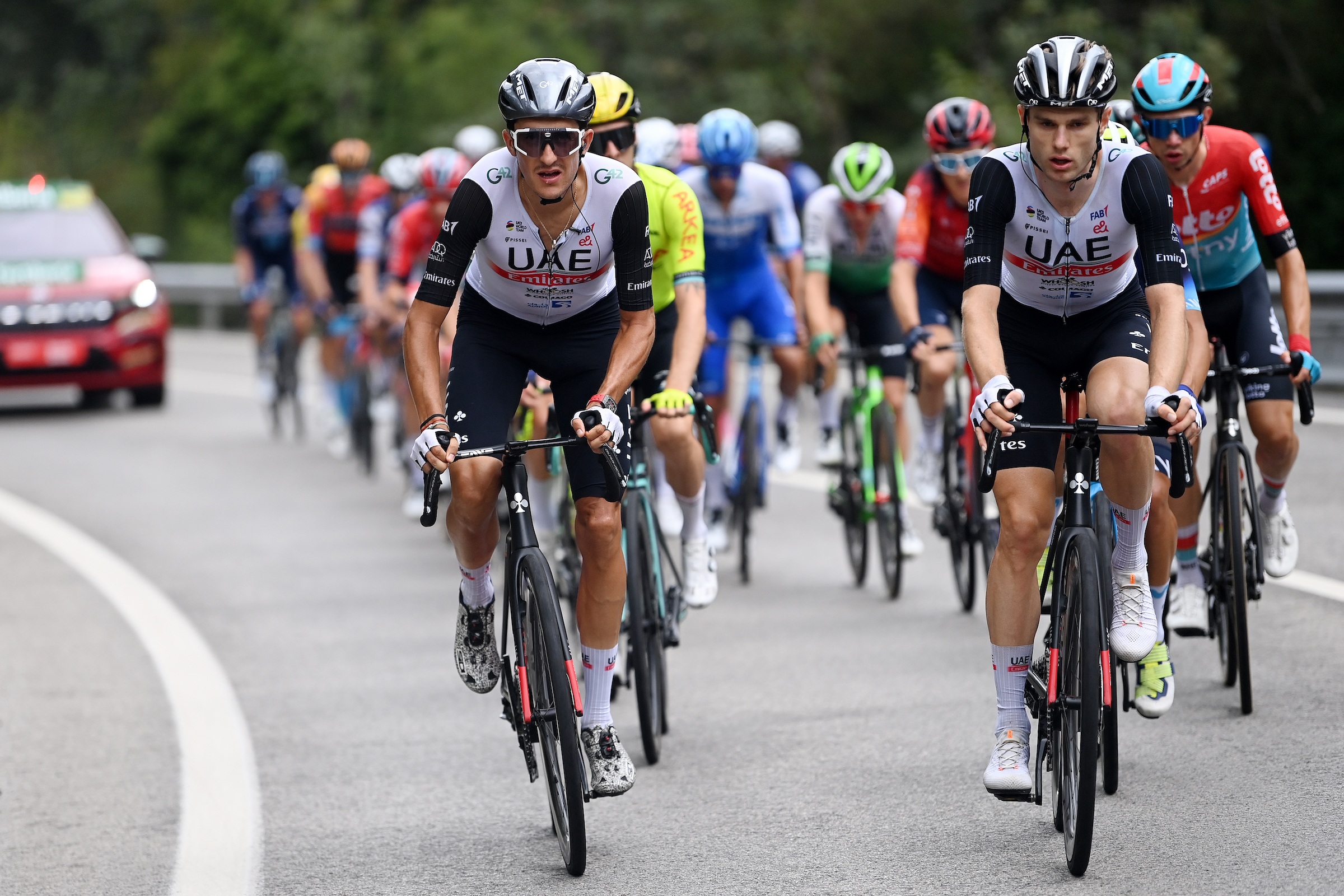
For different reasons, these three young riders will never forget their maiden Grand Tours. The endurance developed, and the experience built will serve as a foundation for the rest of their careers.
For each of the debutants, the 2023 Vuelta a España was about soaking up as much knowledge as possible to build for the future. They all came away with different lessons learned.
“The biggest one is just attrition. I think in a Grand Tour, it's about how much you can save and how efficient you can be. Everything in the first week that you can save benefits in the next couple weeks," Fisher-Black said.
Poole agreed, also noting that part of racing a Grand Tour is simply to expect the unexpected. "Crazy things are happening that you wouldn't really expect in the race," Poole said.
Engelhardt also said that adapting to the circumstances of the race is one of the lessons that he will take away from his first Grand Tour.
“To set new goals and adapt your goals to the circumstances and just manage the problems you have to deal with through a Grand Tour. I guess that's the most important learning,” Englehardt said.

Dan is a freelance cycling journalist and has written for Cyclingnews since 2023 alongside other work with Cycling Weekly, Rouleur and The Herald Scotland. Dan focuses much of his work on professional cycling beyond its traditional European heartlands and writes a regular Substack called Global Peloton.